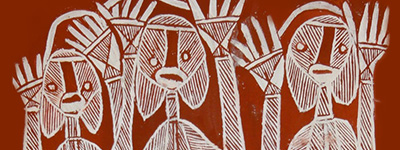Bininj Kunwok
Triangular Kinship Terms

About Bininj Gunwok Triangular Kinship Terms
This educational resource about Indigenous kinship in the western Arnhem Land and Kakadu National Park region of Australia's Northern Territory is produced by the Bininj Kunwok Regional Language Centre — a community-based Indigenous language centre funded by the Australian Government's Indigenous Languages and Arts program.
In a number of Australia's Indigenous languages there are terms that simultaneously encode reference to three-way or 'triangular' relationships. For example, if you are talking to your mother and refer to your uncle (who is your mother's brother) there will be a term that means 'you are my mother, the person I am referring to is my uncle and your brother'. In Bininj Kunwok the term would be na-djumu and your mother would then use a reciprocal term to refer to your uncle. That term is 'ngadjadj ke', or literally 'your uncle' which in this case is the appropriate term a mother uses to refer to her brother when she is addressing her children. If you do the math(s) with the number of basic terms, you will realise that there will be thousands of three-way permutations. There are about 170 terms in the kundebi / kundembuy system. You can explore these in a number of ways on this site. Firstly, you can browse the triangular terms and see the various three way relationships that are covered by a single term. Secondly, you can search for a particular term by entering into the search engine each of the basic kinship relationships in the speech event triad:
- between a speaker and an addressee,
- the speaker and a referent, and
- the addressee and the referent.
You can hear the pronunciation of each term by clicking the link to the audio file.
Standard anthropological kinship abbreviations are used in this resource:
M - mother, F - father, Z - sister, B - brother, S - son, D - daughter, C - child, H - husband, W - wife, f - female ego, m - male ego, BIL – brother-in-law, ZIL - sister-in-law, MIL - mother-in-law, y - younger, e - elder.
Thus:
eB = 'elder brother'
MMB = mother's mother's brother
mC = a man's child
fB = a woman's brother
mZSC = a man's sister's son's child